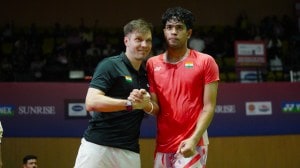Click here to follow Screen Digital on YouTube and stay updated with the latest from the world of cinema.
Half is Still Full
Her first play in Hindi Adhe Adhure happens to be the one that Lillete Dubey has been wanting to do since her college days.
What has time and space got to do with love,hate,empathy,joy or sorrow? Some things transcend the boundaries of time. For instance,Mohan Rakeshs classic Hindi play Adhe Adhure,which was written in 1969 and interpreted and re-interpreted by various theatre directors over last 40 years.
This time,its Lillete Dubey who brought Adhe Adhure on to the stage at Tagore Theatre on Friday evening,infusing it with her own sensibility and style. Shakespeare is being played for more than 500 years now. Likewise,classics such as
this one need to be reinterpreted,reinvented and kept alive for the coming generations, she says.
Dubey adds that theres a vast majority of people who are not familiar with theatre and her idea is to introduce path-breaking plays such as Adhe Adhure to a new audience. When we keep on doing Alfred Tennyson and Anton Chekhov,why not Mohan Rakesh? she asks.
With more than 30 years experience in theatre,Dubey has produced,directed and acted in some of most successful plays in English theatre in India Tumhari Amrita ,Kanyadaan,Dance Like a Man and Wedding Blues. But Adhe Adhure is special since its Dubeys first Hindi play,one that she has been dreaming of doing ever since her Lady Sriram College (LSR) days in Delhi.
I saw the play at the NSD studio way back when it was done by Manohar Singh. It was then that I decided that when I do theatre,Adhe Adhure will be my first Hindi play. It stayed with me. It took me a long time,but here I am. All my plays are centred around the theme of relationships,and this ones a scene stealer, she says.
Adhe Adhure is about a life incomplete in itself,that of a middle-class family on the brink of collapse,one that Mohan Rakesh wrote in sheer poetry 40 years back. It was the time when the break-up of the family as it were had begun and Mohan Rakesh chronicled it with such depth and insight that the play becomes a universal commentary on relationships,one that any generation at any point of time can connect with. The desires,incapability,discontentment,love is spelt out delicately. Theres no black and white; its a forward looking vision and thats precisely what
makes the play undying, Dubey says.
Rhythm,grammar,diction Dubey says she has worked hard to ensure that the richness of the playwrights language was never compromised upon. The language is pure. Unlike in a Hindi film where you have to speak just two lines at one time,here you have to feel and speak the language for more than two hours and yes,it was a lot of hard work, Dubey says,adding that there was no attempt to change the script in any way,just a bit of editing for reducing the length on stage.
Universal and modern,Dubey admits that playing Savitri,the powerful female protagonist,was simply
gratifying. This is one
play which will play forever, she says.





- 01
- 02
- 03
- 04
- 05





























